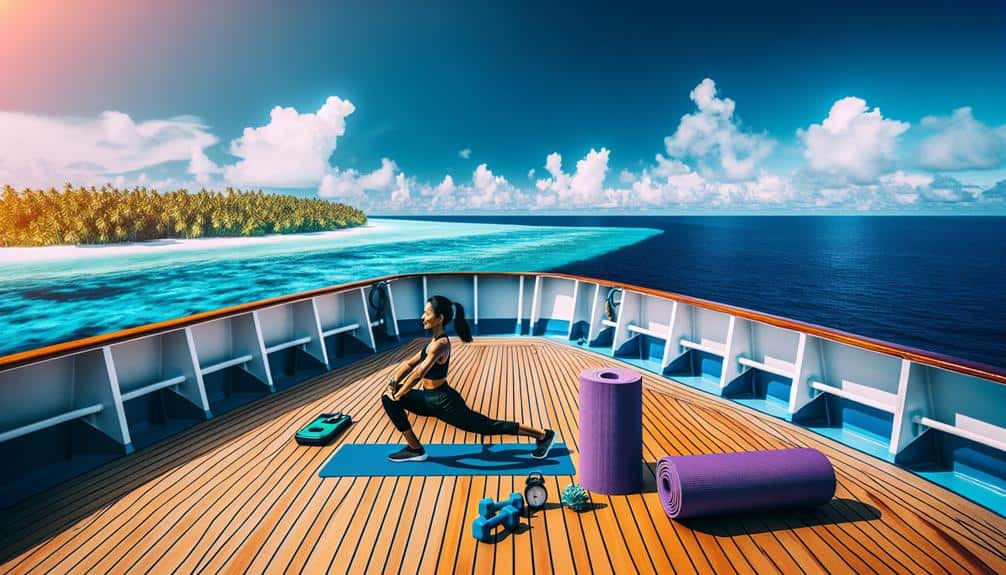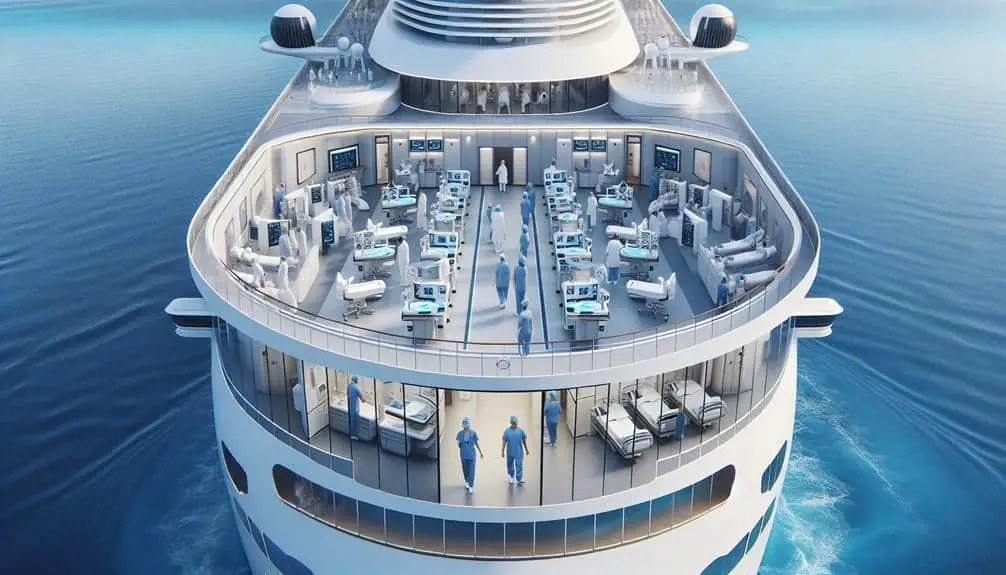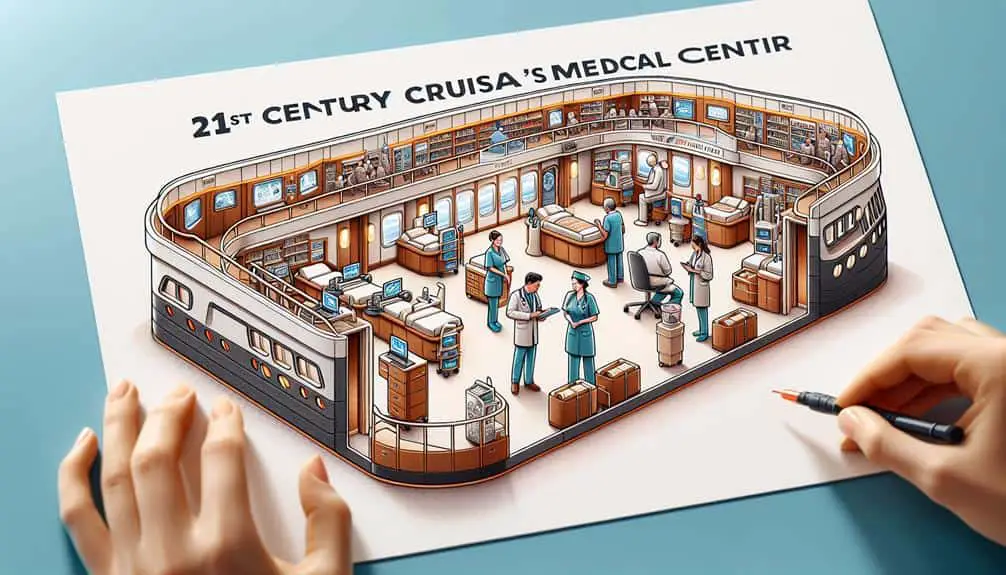Starting on a cruise, prioritize your health. Engage in various fitness classes led by experienced instructors. Enjoy yoga, Pilates, and spin classes. Treat yourself to rejuvenating spa treatments, such as massages and facials. Medical staff are rigorously trained, possessing specialized qualifications. They continuously train and stay updated on advancements. Guarantee health and safety with detailed inspections and rigorous food safety checks. Onboard medical facilities are equipped for emergencies, with well-stocked pharmacies. Health protocols include regular handwashing, disinfection, and prompt quarantine procedures. Stay informed about maintaining health while cruising for a worry-free journey ahead.
Key Points
- Rigorous health and safety inspections ensure compliance with regulations.
- Onboard medical facilities are well-equipped for emergencies.
- Preventive measures include regular disinfection and handwashing.
- Highly qualified medical staff trained to handle various medical issues.
- Prompt quarantine procedures for suspected contagious diseases.
Wellness Programs for Guests
To enhance your cruise experience and prioritize your well-being, take advantage of the diverse wellness programs offered onboard. Fitness classes cater to all levels, from beginners to advanced enthusiasts. Join group sessions like yoga, Pilates, or spin classes to stay active and energized during your voyage. These classes are led by experienced instructors who'll guide you through invigorating routines tailored to boost your fitness levels.
Indulge in rejuvenating spa treatments designed to relax your mind and body. From massages to facials, the spa offers a range of services to help you unwind and de-stress. Treat yourself to a deep tissue massage to soothe tired muscles after a day of exploring ports of call. Try a facial to revitalize your skin and maintain a radiant glow throughout your trip.
Medical Staff Qualifications and Training
The medical staff onboard cruise ships undergo rigorous training and possess specialized qualifications to guarantee the safety and well-being of all passengers. Medical staff expertise is a critical aspect of maintaining health standards onboard. These professionals hold certifications in various medical fields, ensuring they're well-equipped to handle a wide range of health issues that may arise during a voyage.
Continuous training is a priority for the medical staff to stay updated on the latest advancements in medical care and emergency procedures. They undergo regular drills and simulations to sharpen their skills and enhance their ability to respond swiftly and effectively in case of medical emergencies.
In addition to their technical skills, the medical staff also undergo training in communication and interpersonal skills to make sure they can interact compassionately and effectively with passengers who may be experiencing health concerns. This thorough approach to training ensures that the medical team onboard cruise ships is well-prepared to provide high-quality medical care to passengers throughout their journey.
Health and Safety Inspections
As you explore the standards of maintaining health on cruise ships, attention to detail in health and safety inspections becomes a key focus to guarantee the well-being of passengers and crew. Food safety is paramount in these inspections, with rigorous checks ensuring that all food handling procedures meet strict guidelines to prevent foodborne illnesses.
Cleanliness standards are also closely monitored, with regular inspections of public areas, cabins, and facilities to uphold impeccable hygiene levels.
Inspectors evaluate the ship's compliance with health and safety regulations, checking for proper sanitation practices, pest control measures, and the maintenance of medical supplies. They assess the training of staff in handling emergencies, including outbreaks of illnesses, to ensure swift and effective responses.
Any discrepancies found during inspections are promptly addressed to maintain a safe environment for all onboard. By adhering to these meticulous inspection protocols, cruise ships can uphold high health and safety standards, creating a healthy and secure environment for passengers and crew alike.
Onboard Medical Facilities Overview
Within the intricate network of a cruise ship's infrastructure, the onboard medical facilities stand as essential hubs of health and safety oversight. These facilities are equipped to handle a range of medical emergencies that may arise during your journey. Emergency procedures are in place to guarantee swift and effective responses to any health crisis that passengers or crew members may face.
Onboard pharmacies play a pivotal role in providing essential medications and supplies to treat common ailments. They're stocked with a variety of over-the-counter medications, as well as prescription drugs that may be needed for chronic conditions. The medical staff onboard is trained to administer care for a wide array of medical issues, from minor injuries to more serious illnesses.
In the event of a medical emergency, passengers can rest assured that the onboard medical facilities are well-prepared to handle the situation professionally and promptly. It's recommended to familiarize yourself with the location of these facilities upon commencing your journey to ensure a safe and healthy trip.
Health Protocols for Contagious Diseases
Amidst the dynamic environment of a cruise ship, stringent health protocols for contagious diseases are meticulously implemented to safeguard the well-being of all passengers and crew members. When it comes to maintaining health onboard, prevention measures and quarantine procedures play an essential role in preventing the spread of contagious illnesses.
Here's what you need to know:
- Prevention Measures:
- Regular handwashing with soap and water or using hand sanitizers.
- Encouraging passengers and crew to cover their mouths when sneezing or coughing.
- Implementing routine cleaning and disinfection of frequently touched surfaces.
These prevention measures are critical in minimizing the risk of contagious diseases spreading on a cruise ship. Additionally, in the event of a suspected case, prompt quarantine procedures are enacted to isolate the individual and prevent further transmission. By adhering to these protocols, cruise ships aim to maintain a healthy environment for all onboard.
Frequently Asked Questions
Are There Any Restrictions on Bringing Your Own Medications or Medical Supplies Onboard a Cruise Ship?
You might be concerned about limitations, but rest assured that you can bring your medications and medical supplies on board a cruise ship. Guarantee personal storage, familiarize with emergency procedures, and enjoy your trip worry-free.
How Often Are the Medical Facilities on Cruise Ships Restocked With Necessary Supplies and Medications?
Medical facilities on cruise ships undergo supply rotation regularly to guarantee necessary medications and supplies are stocked. Inventory management systems track usage trends. This supports emergency response readiness and requires close coordination among the medical team.
Is There a Designated Quarantine Area on the Cruise Ship in Case of a Contagious Disease Outbreak?
So, when it comes to a contagious outbreak, you might wonder, is there a designated quarantine area on the cruise ship? Well, rest assured, every vessel has a well-equipped, isolated space for such scenarios.
Can Passengers Request a Private Consultation With the Ship's Medical Staff if Needed?
Yes, you can request a private consultation with the ship's medical staff. There may be restrictions on certain medications, but the medical team will assist you. Facilities are well-stocked, and additional measures are in place for contagious disease outbreaks.
Are There Any Additional Health and Safety Measures in Place for Passengers With Pre-Existing Medical Conditions?
For passengers with pre-existing medical conditions, cruise ships have medical accommodations in place to address accessibility concerns. Health screenings may be necessary, and emergency procedures are outlined to guarantee passenger safety and well-being.



